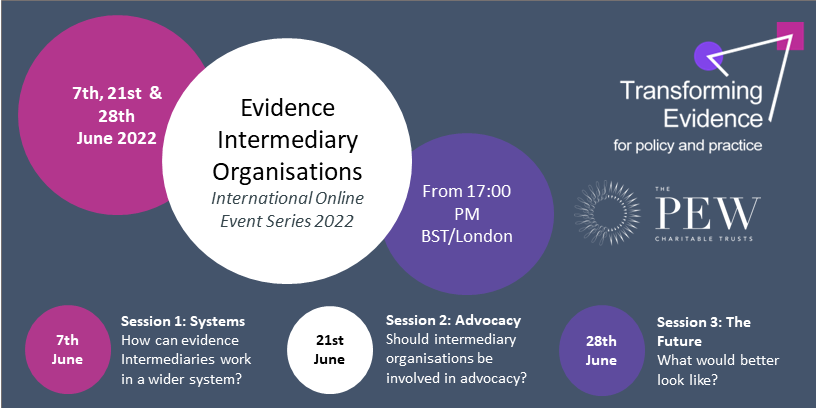
What are the best ways for Evidence Intermediary Organisations to connect research with policy and practice?
In June 2022 we hosted three Zoom events providing practical advice from the leaders of these bodies - and funders, researchers, and practitioners - from Europe, Africa, North America, the Middle East, and Latin America. Recordings are available now using the links below.
The discussions were aimed at anybody with an interest in intermediary organisations – in the public sector, NGOs, funding bodies, think-tanks, and universities.
07 June Session 1: SYSTEMS - How can evidence intermediary bodies work in a wider system?
21 June Session 2: ADVOCACY - Should intermediary organisations be involved in advocacy?
28 June Session 3: THE FUTURE - What would better look like?
Programme and Session Overview
Session 1: SYSTEMS - 17.00 to 18.15 BST (London), 07 June 2022
How can evidence intermediary bodies work in a wider system?
Evidence intermediaries cannot work in isolation. Their core purpose is to work with different communities, and operate in a wider system, including the ‘supply side’ of universities and other producers of research, as well as the ‘demand side’ in policy and practice. But how can intermediaries navigate and influence this wider system?
Confirmed speakers and panellists include:
Session 2: ADVOCACY - 17.00 to 18.15 BST (London), 21 June 2022
Should intermediary organisations be involved in advocacy?
Many intermediaries know they cannot passively wait for elected officials and public servants to come to them for evidence. Even as neutral ‘honest brokers’ they need to proactively engage policymakers, including promoting the value of some types of evidence. Should intermediaries take on this role? If so, what are best ways for intermediaries to manage politics, politicians and government whilst sustaining political independence and non-partisanship?
Confirmed speakers and panellists include:
Session 3: THE FUTURE - 17.00 to 18.30 BST (London), 28 June 2022
What would better look like?
New evidence intermediaries are being constantly set up around the world. But many work in silos – and don’t learn from other sectors or countries. Is there more we can do to collaborate? How do we manage competition and lack of coherence?
Confirmed speakers and panellists include:
For questions about the event, email us on: info@tranforming-evidence.org